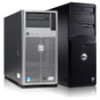Dell PowerEdge T710 Hardware Owner's Manual - Page 166
Troubleshooting System Cooling Problems, Troubleshooting a Fan
 |
View all Dell PowerEdge T710 manuals
Add to My Manuals
Save this manual to your list of manuals |
Page 166 highlights
Troubleshooting System Cooling Problems Ensure that none of the following conditions exist: • System cover, cooling shroud, drive blank, or front or back filler panel is removed. • Ambient temperature is too high. • External airflow is obstructed. • Cables inside the system obstruct airflow. • An individual cooling fan is removed or has failed. See "Troubleshooting a Fan" on page 166. Troubleshooting a Fan WARNING: Only trained service technicians are authorized to remove the system cover and access any of the components inside the system. Before you begin this procedure, review the safety instructions that came with the system. 1 Locate the faulty fan indicated by the LCD panel or the diagnostic software. 2 Turn off the system and all attached peripherals. 3 Open the system. See "Opening the System" on page 85. 4 Reseat the fan's power cable. 5 Restart the system. If the fan functions properly, close the system. See "Closing the System" on page 86. 6 Place the system upright and on its feet on a flat and stable surface, reconnect the system to the electrical outlet, and turn on the system and attached peripherals. 7 If the fan does not function, turn off the system and install a new fan. See "Installing a Cooling-Fan Module" on page 137. 8 Restart the system. If the problem is resolved, close the system. See "Closing the System" on page 86. If the replacement fan does not operate, see "Getting Help" on page 193. 166 Troubleshooting Your System















